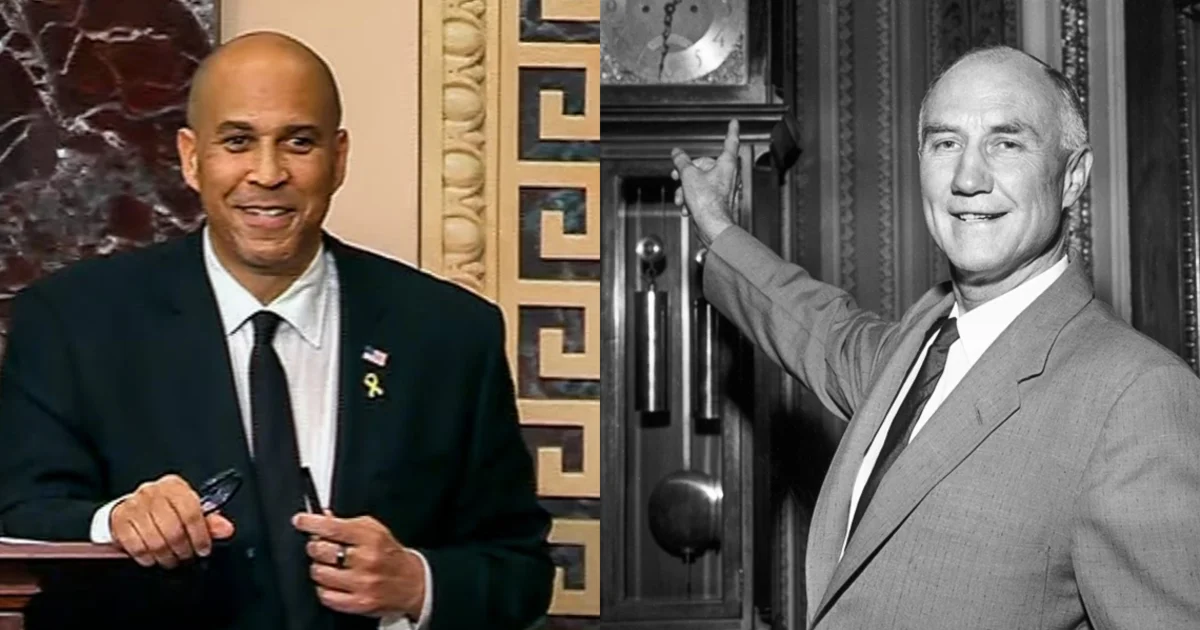After 20 hours of standing on the Senate floor, delivering what would become a record-breaking speech about the need for resistance against the Trump administration, Sen. Cory Booker of New Jersey said, in a weary voice: “Don’t let this be just another day in America.”
By many indications, it was not.
With 25 hours and 5 minutes in total, Booker broke the Senate speech record held by Sen. Strom Thurmond of South Carolina, who argued for 24 hours and 18 minutes against the Civil Rights Act of 1957, which established voting rights protections for Black people.
Southerners “should go down fighting” against the bill, Thurmond said nearly seven decades ago.
“In honorable defeat they may sound an alarm to fellow Americans not yet awake to dangers to the republic,” he said. Passage of the bill “would be a defeat for all citizens of whatever race or region, for it would help to set the stage for dictatorship and oppression. The compromise on which passage now seems to hinge is only a deceptive detail in a dirty business.”
But Booker said it always bothered him that Thurmond held the record.
In setting a new standard before a full chamber, Booker created “a direct juxtaposition” with Thurmond’s filibuster, said historian Stephen G. Hall, the editor-in-chief of HistorianSpeaks, a Black history platform.
“What Booker was trying to do by breaking the record is raise some concerns about what many feel today is a curtailment of democracy, an attempt to undermine democratic principles, to break certain covenants between the people and the government, between universities and the government, between looking at the issues of diversity, equity and inclusion, saving federal jobs and so forth.
“By breaking the record,” Hall added, “Booker showed that the power of democratic thought is more substantial than the attempts to curtail it.”
Booker invoked civil rights icon Rep. John Lewis of Georgia multiple times in his speech. He said Lewis “endured beatings savagely on the Edmund Pettus Bridge, at lunch counters, on freedom rides. He said he had to do something. He would not normalize a moment like this. He would not just go along with business as usual. He said for us to go out and cause some good trouble, necessary trouble, to redeem the soul of our nation.”
Booker, who was mentored by Lewis, added that he remembered telling Lewis, who died in 2020, “We’ll do everything possible to make you proud.”
His speech was part of that promise. Booker said on MSNBC after completing the marathon address: “To be candid, Strom Thurmond’s record always kind of just really irked me — that he would be the longest speech, that the longest speech on our great Senate floor was someone who was trying to stop people like me from being in the Senate. So to surpass that was something I didn’t know if we could do, but it was something that was really, once we got closer, became more and more important to me.”
The exhausting effort was a call to action by Booker. In just over two months, President Donald Trump has used executive orders to dismantle federal agencies and upend the federal workforce.
“Booker’s speech was useful,” Hall said, “to the extent that he used a long speech to draw attention to a particular issue, to raise certain concerns about what’s going on in the country, to admonish people to think more deeply about these kinds of issues, and served as a clarion call to various constituencies that Democrats are going to play a role in pushing back against some of the things that we’ve seen come out of the Trump administration.”
People certainly watched. According to his office, Booker’s speech got more than 350 million likes on his TikTok livestream, with more than 300,000 viewers at once. He received more than 28,000 voice messages of encouragement, too.
“There’s a lot of people out there asking Democrats to do more and to take risks and do things differently,” an exhausted Booker told reporters after he walked off the floor. “This seemed like the right thing to do.”
In preparation, Booker relied on 1,164 pages of materials and fasted in the days leading up to the speech to avoid a bathroom break, which would mean having to yield his time on the floor. “I stopped drinking water a long time ago,” he said. “I think that had good and bad benefits. I definitely started cramping up from lack of water.”
